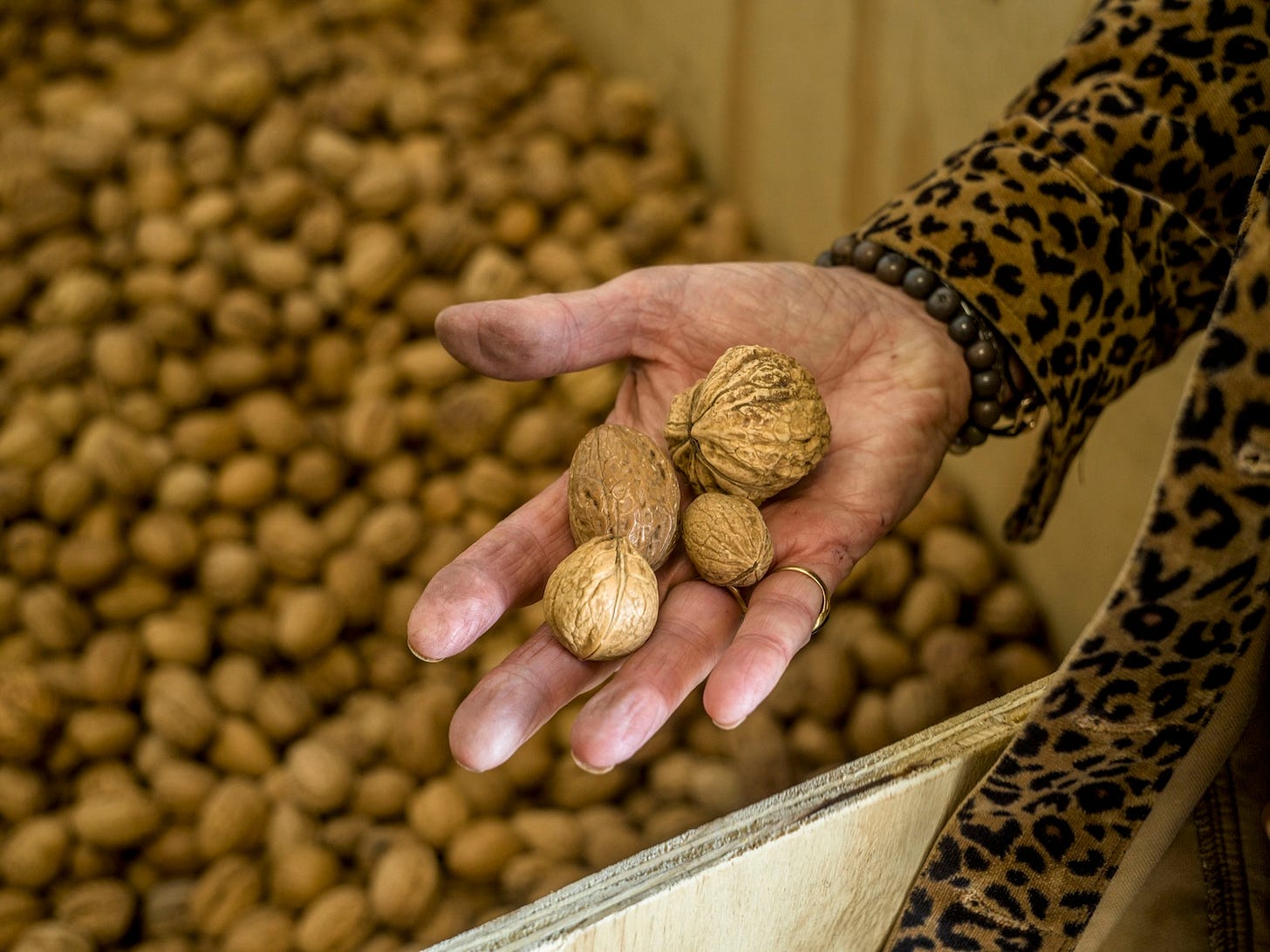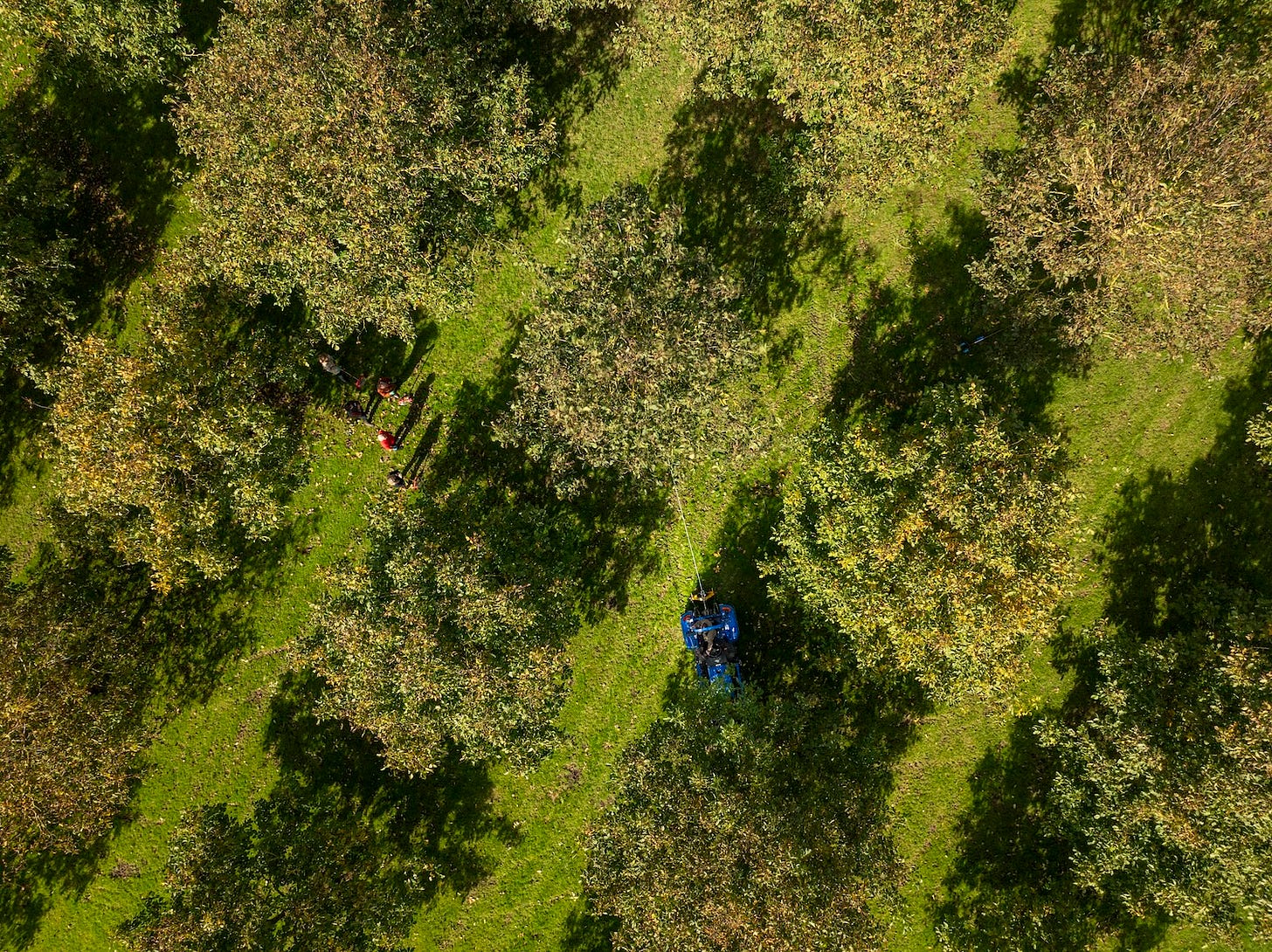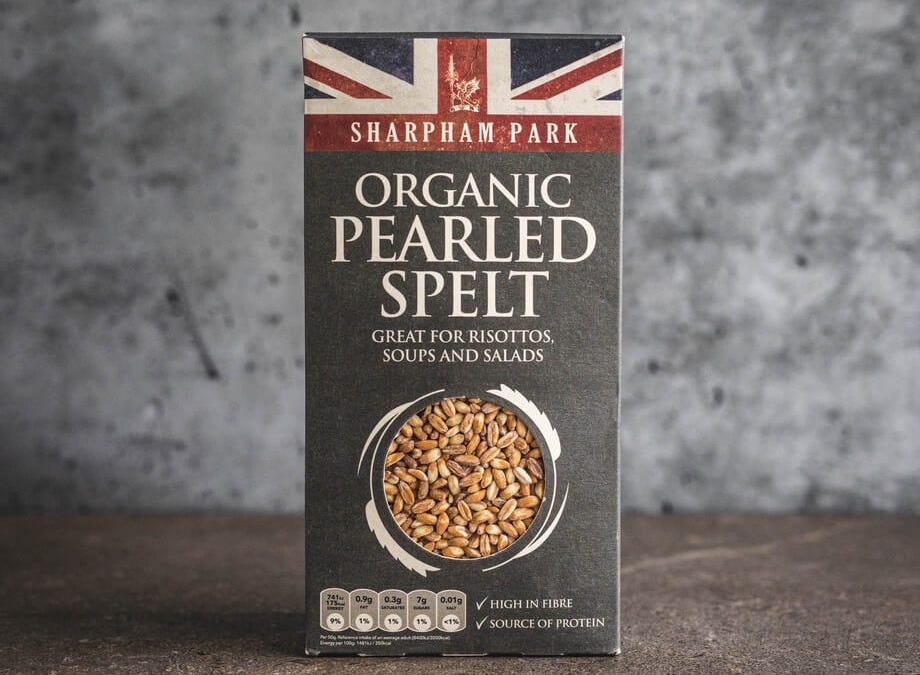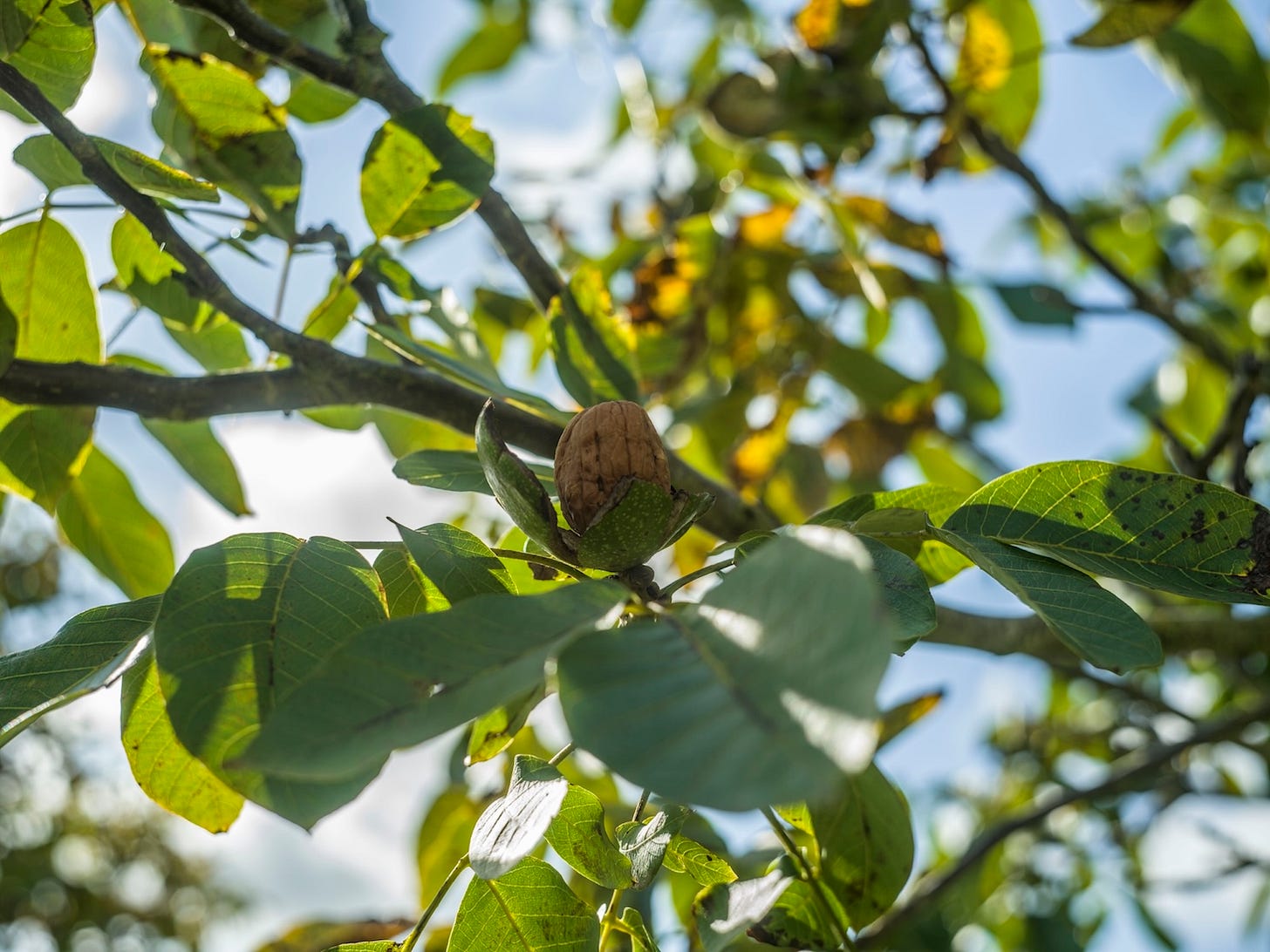"The margins on a bag of flour are nothing like the margins on a handbag"
Amid one of the biggest nut harvests in recent memory, Glastonbury farmer Roger Saul reflects on the ticking "timebomb" of British farming
In 2003, after finding what appeared to be the remnants of a Glastonbury monk’s lunch encased in a 16th century stone wall (nut shells included), Roger Saul thought he should go about growing his own walnuts.
Having just left Mulberry – the multimillion fashion label he founded in 1971 – and taking on Glastonbury farm Sharpham Park, Roger expected his newly-planted trees would need about five years to start producing. 15 years later, they offered their first fruit, and with a meagre 300 kilogram harvest.
Firsthand, Roger found out why Britain doesn’t grow much of its own nuts – though the trees can largely be left to their own devices, they are fickle (especially in such a wet climate), generally preferring warmer parts of the world like Iran, Turkey, and southern China.
That being said, Britain’s changing climate is bringing forward a more and more hospitable environment for nut growing. This long, warm summer and autumn we’ve just had has lent local fruit and nut growers one of their best yields in history (spare a thought for cereal farmers, mind), asking whether a revitalisation of British-grown nuts – limited to cobnuts, walnuts, chestnuts, and on occasion almonds – and fruit could well be on the horizon if things keep going the way they are.
Walnuts haven’t always been Sharpham Park’s hero crop – the farm grows all sorts including apples, pears, cherries, greengages, and from 2004 up until two years ago it championed the ancient grain spelt. Does Roger have a knack for pivoting, then, or is swapping handbags for horticulture and spelt for walnuts not as radical a departure as it seems?
Taking place in the middle of Roger’s biggest walnut haul to date, the following exchange is pretty close to verbatim, but edited for clarity and brevity.
Hugh: I found my local organic shop is selling your walnuts, and they seem to be not necessarily sweeter but much less bitter than what you’d usually buy out of the packet off the shelf. And definitely more buttery. Does that have anything to do with how and where they’re grown?
Roger: Very hard to say. Generally what you get in the supermarket would come from the States, China, Far East, or Middle East – that sort of thing. Perhaps Turkey, maybe France. But if they’ve already been cracked and shelled, my guess is they will have been chilled right down to preserve and transport them. So that’s when you get this desiccated taste to them. It still tastes nice, but they’ve lost some of that creaminess and freshness.
Hugh: So do they last longer in the shell?
Roger: I’m still eating a few of last year’s. They can last 12 months in the shell, but it does depend.
Hugh: There’s something about that – foods being so sensory. Walnuts have a distinct clacking sound when you chuck them in a bag and they rub together. And then when you go home you have the satisfaction of cracking them. That’s much more of a tactile experience than it is tearing open a plastic bag. I remember at home we’d have cobnuts, and we’d break into them with an old, ornate-looking nutcracker, made of brass or something. And I think those sensory experiences that better connect us with food we’re losing a bit. And maybe it’s connected to food culture, and whether there is a food culture under the surface in Somerset, and whether we want to start enjoying it again.
Roger: Well, I think you’re absolutely right and there is no reason why not. It’s a question really though, isn’t it, of almost taking a map of Somerset and putting little pins in it and saying, okay, we’ve got this type of apple here, we’ve got that pear there. Here’s all the different things we’re producing – what could we do more of?
Hugh: What does that mean in your part of Glastonbury? There’s also Andrew Kent [Glastonbury Nut Farm] near you – does that say something about the soil or conditions within your area?
Roger: Walnuts love clay, and we’re in a clay-heavy area. They like having dry feet. We are very nearly on the Somerset Levels, and our walnut trees – the lowest row in each of the fields – is where water tends to collect. They don’t like it, and are half the size of the bigger ones. But the soil around us when we’re not on the peat moor, which is acid and peat, gives perfect conditions.
Hugh: I’m hearing from fruit growers the harvest has been enormous this year – could you put that into numbers from what you’ve seen?
Roger: We will have harvested probably about two and a half tonnes of walnuts this year. And that would’ve compared with probably three quarters of a tonne last year or just under a tonne, which was disastrous.
Hugh: What happened?
Roger: Late frosts and a wet, cold spring. But it was much the same for apples. So I think apples and fruit in general – anything that’s an early blossom – is the one that gets hit in this country.
Hugh: Do you feel there’s a bit of a moral dilemma then, in that you’re always hoping for a good harvest, as you’ve had this year, but at the same time, not wanting the shift in climate that’s causing it?
Roger: It’s going to happen to us whatever, isn’t it? It’s nothing you and I can change. We’ve got to really try and adapt to work with it. The whole imbalance of everything is a timebomb waiting to happen, in that we seem to be in a changing climate, which we all understand, but we have a government that is penniless in terms of looking at farming and food, and the last government was no better. No government seems to have paid any attention to the future of food for probably 20 years, I would say. And then if you look at investment generally, why would that go into farming or food at the moment when there is no incentive, no sort of push or pull to help it get there? So these steep changes in what’s happening with our climate and that then affecting apples, grapes, you name it, with a master crop one year, and disaster the next. If you look at grain, it’s smaller yields out of bigger or smaller areas. And then if you look at how much dairy, beef, sheep we are doing, particularly here in Somerset, that balance needs to move more towards vegetables, cereals, fruit, and nuts. Which can be the same land – you could actually do both to a certain extent.
Hugh: I gather that’s what you’ve been doing with your sheep, which are…
Roger: Shropshire sheep. Which we chose as they don’t eat the bark off the trees. Except if they’re rams at a certain time of year, which we found to our cost.
Hugh: When you first bought the farm it was an old dairy farm, is that right? Quite conventional?
Roger: It was. When they were growing corn [as cattle fodder], they would’ve used all sorts of chemicals, but fortunately the farm hadn’t had a vast amount of chemicals put on it because it didn’t need to. As we transitioned to organic we had a lovely farmer from Highgrove who came in and advised me what to do. He said [when farming at Highgrove], “I would bring in an aeroplane to spray the crops and kill the blackfly. Now I watch the blackfly land on the beans and go, oh no, what’s going to happen? And then along came the ladybirds and ate the blackfly.” That cycle of an organic farm compared to a nuclear farm, if you like, is very, very different.
Hugh: From what you said before, it doesn’t sound like you particularly miss growing cereal crops.
Roger: Yes and no. I mean we loved doing our spelt, but I think if you look at the yields this year, although the quality has been much better, the yields generally for wheat and cereals have been pretty poor, particularly spring-sown. So it’s going to get more difficult for farmers to know what they’re inputting and what they’re going to get out of it.
Hugh: What happened exactly on the spelt side of things? Why did you have to shut it down?
Roger: We’d seen what happens with big international fluctuations before, ever since my Mulberry days. But Brexit was especially what hit us. [During COVID] you remember the whole thing of [everyone] buying bread, we just couldn’t produce enough and we had standing orders from Waitrose who were saying, look, give us whatever you can possibly produce. But we then hit Brexit, and lost all our international business overnight.
Hugh: Do you have a rough idea of how much you were exporting to up to that point?
Roger: About 25%. None of those independent retailers around Europe were remotely interested in going through the hoops they had to to import from the UK, and we weren’t doing anything big enough on a scale to make it worthwhile setting up offices in Europe to import for us, which some companies did do and got round the problems. We didn’t really lose business with the supermarkets, but what we found was that they wouldn’t take in any new business. We could get spelt into Planet Organics and the independents, but we couldn’t get the critical mass of volume. I think I learned fairly quickly in our agricultural life that the margins on a handbag are nothing like the margins on a bag of flour.
Hugh: What about the local market? If we’re talking about local people being interested in local food, especially in and around Somerset, is the desire there overall just not enough?
Roger: We were in the millions. At that sort of level, you cannot rely on local to supply that. We would’ve been talking about 60 to 70% of our trade going through the big supermarkets like Waitrose, Sainsbury’s, Ocado. I think the typical situation is when you get an exciting period – which we had as we grew with our spelt – people are excited about taste and tasting what’s natural and sustainable. If you can bring those things together, which is what we did with our spelt, we had a huge following. But as soon as you hit crisis periods, be it banking or economic, as we’re going through now, supermarkets inevitably have to look at the bottom line and that means they have to look very hard at price.
Hugh: Is it a similar sort of story for walnuts?
Roger: We’re on a much smaller scale now, and have really worked hard on direct-to-consumer, which is where 70% of our turnover is from. Also we’re with Able & Cole and Teals and The Newt and business like that. It’s much more of a singular product, though we’re looking at doing walnut chocolate, walnut oil, walnut pesto, and pickled walnuts. But for that we are looking into next year, hoping we get another good – if not better – harvest.







